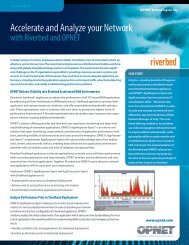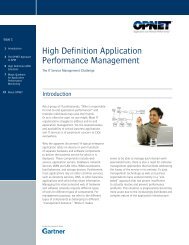Create successful ePaper yourself
Turn your PDF publications into a flip-book with our unique Google optimized e-Paper software.
The following table summarizes the tax years that are either cur-<br />
rently under audit or remain open under the statute of limitations<br />
and are subject to examination by the tax authorities in the most<br />
significant jurisdictions that we operate:<br />
Australia FY08 – FY09<br />
Belgium FY08 – FY10<br />
France FY07 – FY10<br />
Germany FY05 – FY09<br />
Singapore FY08 - FY10<br />
United Kingdom FY10<br />
United States FY08 – FY10<br />
Maryland FY07 – FY10<br />
We are currently under an income tax audit in Germany for fiscal<br />
years 2005 through 2007.<br />
Our continuing practice is to recognize interest, if any, related to<br />
income tax matters in interest expense in our consolidated statements<br />
of operations and penalties as part of general and administrative<br />
expense in our consolidated statements of operations.<br />
During fiscal <strong>2011</strong>, we recognized $9,000 in potential interest<br />
expense associated with uncertain tax positions. During fiscal 2010,<br />
we recognized $6,000 in potential interest expense associated with<br />
uncertain tax positions and reversed $13,000 associated with potential<br />
claims barred by the statute of limitations. The total accrued<br />
interest and accrued penalties related to uncertain tax positions at<br />
March 31, <strong>2011</strong> was $17,000 and $107,000, respectively.<br />
We believe it is reasonably possible that changes in the liability for<br />
uncertain tax positions will occur in the next twelve months as a result<br />
of final decisions related to the voluntary payments of our state<br />
and local income taxes. In the aggregate, we believe the liability<br />
for uncertain tax positions could decrease by $30,000 in the next<br />
twelve months.<br />
Stock-Based Compensation. ASC 718 Compensation – Stock<br />
Compensation requires an entity to recognize an expense within<br />
its income statement for all share-based payment arrangements,<br />
which include employee stock option plans, restricted stock grants,<br />
and employee stock purchase plans. We have elected to use<br />
straight-line amortization of stock-based compensation expense<br />
for the entire award over the service period since the awards have<br />
only service conditions and graded vesting. Our stock options and<br />
nonvested stock do not contain performance conditions. There<br />
have been no modifications to awards in <strong>2011</strong> or 2010.<br />
Our stock option grants are accounted for as equity awards. The expense<br />
is based on the grant-date fair value of the options granted,<br />
which we recognize over the requisite service period.<br />
To estimate the grant-date fair value of our stock options, we use<br />
the Black-Scholes option-pricing model. The Black-Scholes model<br />
estimates the per share fair value of an option on its date of grant<br />
OPNET Technologies, Inc. <strong>2011</strong> <strong>Annual</strong> <strong>Report</strong><br />
15<br />
based on the following: the option’s exercise price; the price of<br />
the underlying stock on the date of grant; the estimated dividend<br />
yield; a “risk-free” interest rate; the estimated option term; and the<br />
expected volatility. For the “risk-free” interest rate, we use a U.S.<br />
Treasury bond due in a number of years equal to the option’s expected<br />
term. To estimate expected volatility, we analyze the historic<br />
volatility of our common stock. We did not grant any stock options<br />
during fiscal <strong>2011</strong>. As of March 31, <strong>2011</strong>, nonvested stock-based<br />
deferred compensation associated with the stock options totaled<br />
$710,000, which we expect to recognize over a weighted average<br />
period of 2 years.<br />
We recognize compensation cost for stock option grants on a<br />
straight-line basis over the requisite service period for the entire<br />
award from the date of grant through the period of the last separately<br />
vesting portion of the grant. We recognize compensation<br />
cost within the income statement in the same expense line as the<br />
cash compensation paid to the respective employees. ASC 718 also<br />
requires us to estimate forfeitures in calculating the expense related<br />
to stock-based compensation. We have concluded that our historical<br />
forfeiture rate is the best measure to estimate future forfeitures<br />
of granted stock options. We will recognize the impact on compensation<br />
cost due to changes in the expected forfeiture rate of 10% in<br />
the period that they become known. We do not apply a forfeiture<br />
rate to the options granted to certain key executives or directors.<br />
We have concluded that historically certain key executives and<br />
directors will perform the requisite service to vest in the award.<br />
We account for our restricted stock grants as equity awards. The<br />
expense is based on the price of our common stock, and is recognized<br />
on a straight-line basis over the requisite service period.<br />
The restricted stock agreements do not contain any post-vesting<br />
restrictions. We have concluded that our historical forfeiture rate is<br />
the best measure to estimate future forfeitures of granted restricted<br />
stock. We will recognize the impact on compensation cost due<br />
to changes in the expected forfeiture rate of 10% in the period<br />
that they become known. We do not apply a forfeiture rate to the<br />
restricted stock granted to certain key executives or directors. As of<br />
March 31, <strong>2011</strong>, nonvested stock-based deferred compensation associated<br />
with restricted stock totaled $2.3 million, which we expect<br />
to recognize over a weighted average period of 1 year.<br />
Our 2000 Employee Stock Purchase Plan, or ESPP, provides all<br />
eligible employees to collectively purchase up to a total of 3,070,000<br />
shares of our common stock. On September 14, 2009, our stockholders<br />
voted to increase the number of shares authorized for<br />
issuance under the ESPP from 820,000 shares to 3,070,000 shares,<br />
effective February 1, 2010. An employee may authorize a payroll<br />
deduction up to a maximum of 10% of his or her compensation during<br />
the plan period. The purchase price for each share purchased is<br />
the lesser of 85% of the closing price of the common stock on the<br />
first or last day of the plan period. The plan period for the ESPP ends




